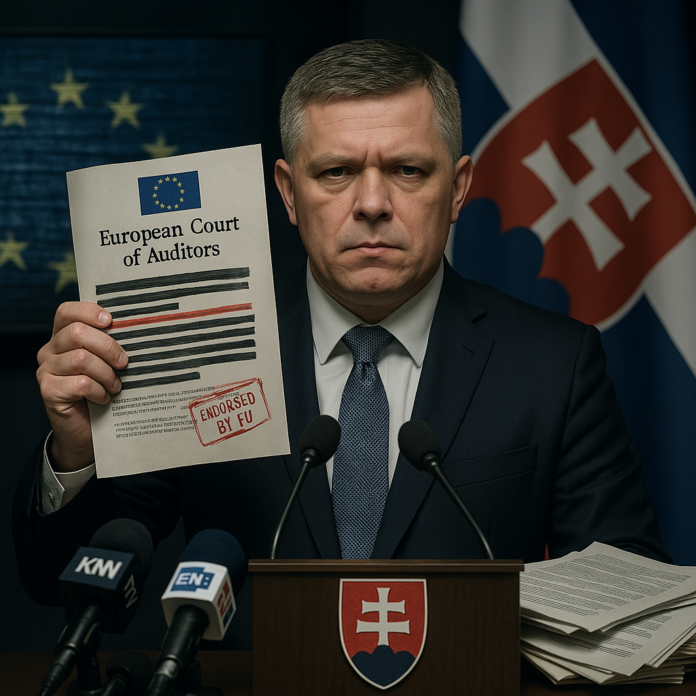Slovakia’s government is invoking a false European mandate to justify a sweeping crackdown on civil society. Citing a European audit that never endorsed their actions, Prime Minister Robert Fico’s administration is pushing legislation that would stigmatise NGOs with foreign funding as agents of external influence — a move condemned by the Council of Europe as a threat to democratic freedoms. While the European Court of Auditors explicitly cleared NGOs of wrongdoing and criticised only internal EU funding procedures, Slovak officials have distorted its findings to legitimise domestic repression. European institutions have not endorsed the law — they have warned against it.
Slovakia’s ruling coalition, led by Prime Minister Robert Fico and his Smer-SD party, is attempting to push a law through Parliament that would place extensive restrictions on non-governmental organisations (NGOs). The legislation targets NGOs with foreign funding and aims to brand their advocacy work as lobbying “on behalf of foreign interests.”
The Government Office, headed by Juraj Gedra, publicly claimed on 10 April that the draft law reflects “the European path” and is “confirmed” by a recent report from the European Court of Auditors (ECA), the EU’s official financial watchdog. According to their statement, the law is necessary to “ensure transparency” and to prevent certain NGOs from “pushing external agendas.” No evidence has been provided to support these claims.
Brussels Never Said That: Slovak Leaders Twist EU Audit
The European Commission had already raised alarms about Slovakia’s direction in 2023, when a previous version of the NGO law attempted to label foreign-funded organisations as “foreign agents” — an approach reminiscent of authoritarian regimes. While the Commission acknowledged the absence of formal lobbying regulation in Slovakia, it warned against stigmatising or targeting civil society in the process.
The Slovak Government’s justification hinges on a fundamental misrepresentation. The ECA did release a report in early 2025 — but it focused exclusively on how the European Commission and EU member states administer financial support to NGOs. It did not investigate or criticise the NGOs themselves.
In its findings, the ECA noted that EU definitions of NGOs are inconsistent across member states, and that oversight of funding recipients needs improvement. However, it explicitly stated that the organisations it audited complied with EU transparency rules. The watchdog concluded: “Transparency requirements under the EU’s budgetary and legal framework were overall respected.”
There is no mention in the report of NGOs being non-transparent or acting as agents of foreign influence. Nor does it call for new national legislation — let alone the kind of legal framework Slovakia is pursuing.
Slovak civil society figures have condemned the Government’s narrative. Filip Vagač, from the democracy watchdog Platforma pre demokraciu (Platform for Democracy), called the interpretation “dishonest and dangerous.” He stressed that the auditors criticised flaws in the EU’s internal mechanisms — not the actions of NGOs.
The European Court of Auditors itself distanced from the Slovak Government’s claim. Its spokesperson, Matthias Beermann, told EURACTIV Slovensko that the ECA “cannot comment on national governments’ interpretations” and that their report focused strictly on “EU funding procedures.” The auditors reiterated that their mandate does not include evaluating national legislation or the general transparency of NGOs.
Slovakia’s Government Invents an EU Endorsement That Doesn’t Exist
Moreover, the ECA — as an EU body — could not possibly share the Government’s view that NGOs represent “foreign” interests, since promoting EU values is not foreign interference.
The broader context of the ECA report reflects internal EU political disputes. A group of conservative Members of the European Parliament (MEPs) had voiced concern that environmental and rights-based NGOs, funded through the EU’s LIFE programme, were exerting undue influence on legislation.
But the LIFE programme was approved in 2020 by the European Parliament itself to ensure civil society groups could counterbalance well-funded business lobbies. The European Commission does not select grant recipients, nor does it dictate advocacy topics. All awarded grants are publicly listed. There is no evidence of undue influence or political manipulation.
While the Slovak Government misuses the ECA report to argue its case, the real European response came on 9 April from the Council of Europe — an international human rights body to which Slovakia is a signatory. The Council’s Human Rights Commissioner, Michael O’Flaherty, issued a formal recommendation urging the Slovak Parliament to reject the law in its current form.
He warned that the proposal threatens civic space and breaches standards under the European Convention on Human Rights. His concerns include:
- Vague and legally inconsistent definitions of lobbying.
- Discriminatory application of the law exclusively to NGOs.
- Administrative burdens likely to chill civic activity.
- Powers granted to the Interior Ministry to dissolve organisations without judicial oversight.
These provisions, O’Flaherty argued, are disproportionate, unnecessary, and likely to deter legitimate democratic participation.
This Isn’t Europe: Slovakia’s Crackdown Mirrors Authoritarian Playbooks
This law is not an isolated incident. Slovakia has been ranked among the EU’s worst-performing states in rule-of-law metrics by civil liberties organisations. According to the Brussels-based NGO Liberties, Slovakia now joins Hungary, Romania, and Bulgaria as countries that “systematically and deliberately” undermine the rule of law “in nearly all aspects.”
By using EU institutions as cover, Slovakia’s leadership is attempting to cloak domestic repression in a European veneer. But neither the European Commission, the European Court of Auditors, nor the Council of Europe endorse this strategy. The proposed law is not a “European path” — it is a warning sign of democratic backsliding.
Source: Barbara Zmušková | Euractive.sk








